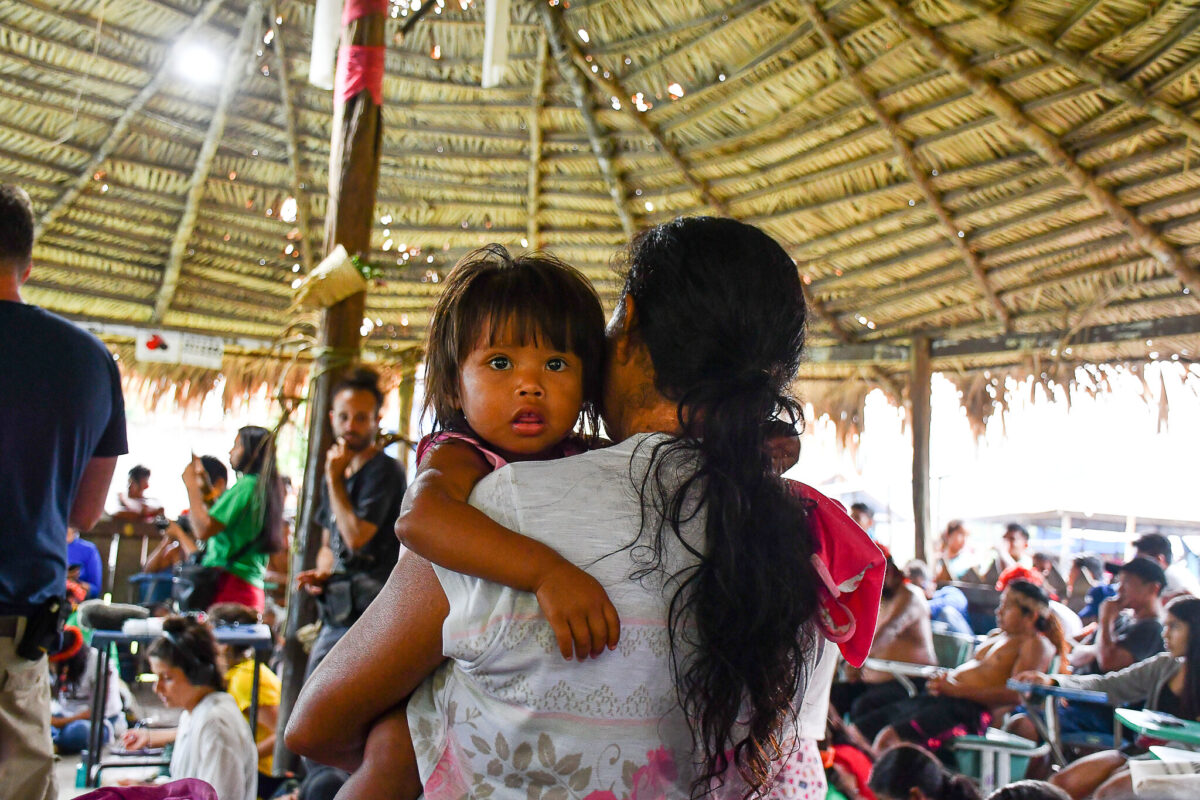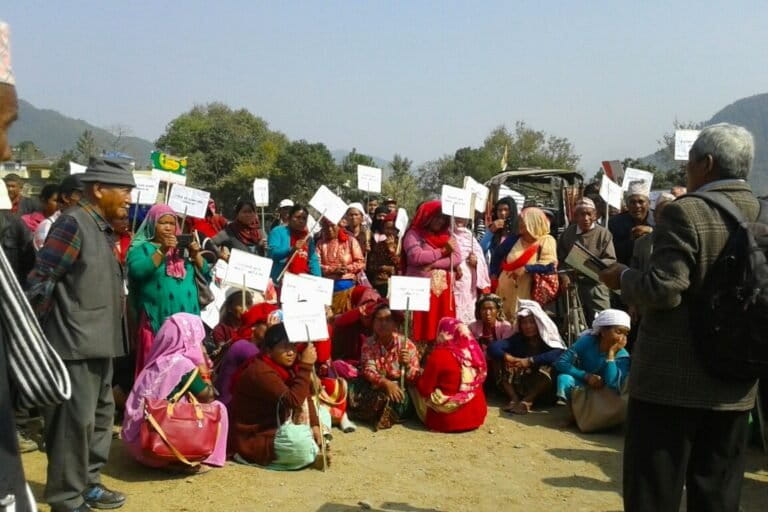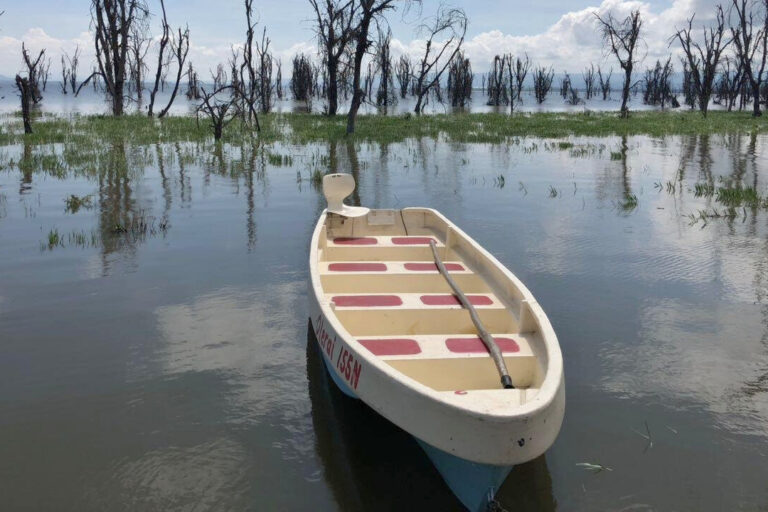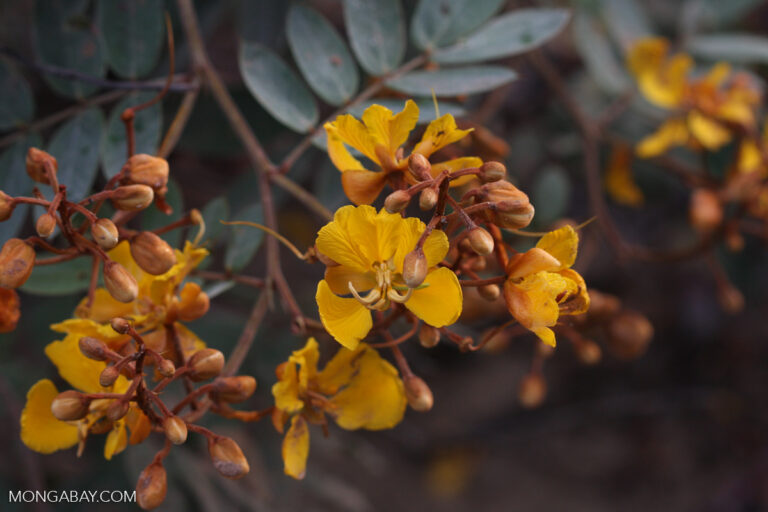- Herakles Farms, a controversial U.S.-based company, plans to clear develop oil palm plantations in the country’s northeast region.
- The company maintains its project will be environmentally sustainable and economically beneficial for local communities. But watchdog organizations say it will displace the habitat of endangered species, hurt the livelihoods of local people, and sully water supplies. Satellite date show many of the plantations are slated to be developed in primary forest.
- International environmental and human rights organizations are speaking out against the conviction of Besingi. His lawyer is calling the charges “trumped up” and says they plan to appeal.
On November 3, Cameroonian activist Nasako Besingi was convicted of four criminal counts against a controversial palm oil company operating in the country. But a coalition of environmental and human rights organizations is denouncing the charges, urging authorities to stop what they call the “repression” of Besingi and other activists.
Besingi is the director of the Cameroonian NGO Struggle to Economize our Future Environment (SEFE), a group galvanizing resistance to the recent development of palm oil plantations in Cameroon by producer Herakles Farms. After three year of legal battles, he was recently convicted of two counts each of defamation and propagation of false news against the U.S. agribusiness company. He was sentenced to pay a fine of $2,400 or face up to three years in prison.
But a group of six international organizations, including Greenpeace Africa and the Environmental Investigation Agency (EIA), refute the legitimacy of the charges. In a statement, EIA referred to the judgment as “a great threat to freedom of expression in Cameroon.”

The object of contention is a group of industrial palm oil plantations in northwest Cameroon, near its border with Nigeria. Run by Herakles Farms, a U.S.-based company, and under management by its local subsidiary SGSOC, the palm oil project officially began in 2009 when Herakles first set up shop in Cameroon. The company originally proposed clearing 70,000 hectares of forest for palm oil production, but the government shot down that proposal and stopped plantation development until 2012, when it gave Heracles a green light – though for a slimmed-down production area of 20,000 hectares.
Conservationists have long-condemned the project. They say that Herakles Farms’ palm oil plantations will come at the expense of important habitat for threatened species like the critically endangered Preuss’s red colobus monkey (Procolobus preussi), the endangered Nigeria-Cameroon chimpanzee (Pan troglodytes ellioti) and drill (Mandrillus leucophaeus), and the vulnerable forest elephant (Loxodonta cyclotis) and red-capped mangabey (Cercocebus torquatus). The plantations are also close to Cross River National Park, just across the border in Nigeria. The park is home to the Cross River gorilla, the world’s rarest and most threatened gorilla subspecies.
Indeed, the forest monitoring platform Global Forest Watch shows the plantations cut into large tracts of primary forest, and abut the small ranges of the Rumpi mouse shrew (Myosorex rumpii) and jinx midwife frog (Alexteroon jynx), both critically endangered species found nowhere else in the world. Recent research finds palm oil plantations can take heavy tolls on amphibians that can’t acclimate to new conditions.

Herakles Farms packaged the project as one that would be environmentally sustainable and socioeconomically beneficial for the communities surrounding the plantations (SGSOC stands for SG Sustainable Oils Cameroon, Ltd). However, in 2012 Herakles pulled out of the Roundtable on Sustainable Palm Oil (RSPO) – the world’s most influential regulator of palm of palm oil production. And a Greenpeace report issued last year accused the company of illegal logging and colluding with government officials to sell the illicit timber to China.
A report published in 2012 by The Oakland Institute, an independent policy think tank, disputed the company’s claims that the plantations would benefit local communities.
“The expected negative social and environmental impacts of the plantation are numerous, including loss of livelihoods, small returns for local communities, and massive deforestation,” the authors write of their investigation, which was conducted cooperatively with Greenpeace International. The report states that because many people in the region depend on subsistence agriculture, the clearing of forests for the palm oil plantations would affect the livelihoods of thousands of people.

In addition, the report references an Environmental and Social Impact Assessment (ESIA) conducted by the company that found pesticides and fertilizers applied to the oil palms may put groundwater and surface water resources at risk of contamination.
“As recognized by the ESIA, the massive use of chemicals typically used in such a large plantation constitutes a major threat to water sources in the area, and to the fish population as well as to the supply of safe drinking water,” the report states.
In reaction to the anticipated environmental and social consequences of plantation development, Nasako Besingi, his colleagues at SEFE, and many others have been campaigning against the Herakles Farms project. For his work, Besingi was awarded the 2012 TAIGO prize and was nominated by Jeune Afrique newspaper as one of the most notable human rights defenders of 2014.
However, his efforts have attracted more than awards.
“Since speaking out, we’ve been subjected to many acts of intimidation including threats, arrests, ambush and beatings,” Besingi wrote in the Huffington Post in 2013. “Most recently, some villagers including myself attempted to demonstrate against this project in the town of Mundemba, close to the proposed plantation area. We were arrested without charge and left in cells to contemplate our ‘crimes’. We contemplated for two days; in the dark, forced to defecate into cups in front of each other because there was no toilet. Yet our only ‘crime’ was nothing more than organizing a peaceful demonstration about people’s land being taken without their consent.”

Photo courtesy of Greenpeace.
Besingi’s proponents view his recent conviction and sentencing as yet more unjustified repression of his and others’ attempts to speak up against the palm oil project.
“I am very surprised by the judgement, the charges against Nasako were trumped up charges and meant to put him away,” Barrister Adolf Malle, Besingi’s lawyer, said in a statement. “We will appeal the judgement in the coming days.”
Greenpeace, EIA, and the other organizations involved in the coalition say the judgment is not just a threat to Besingi, but to other Cameroonian activist organizations and individuals, as well.
“Without the courage of SEFE and others, the voices of local communities and farmers who have little say in what is done with their land and livelihoods, would not be heard,” said Victorine Chethoener of Greenpeace Africa. “Those voices cannot fall silent because of government repression and intimidation.”














